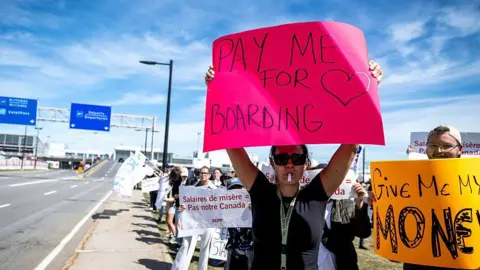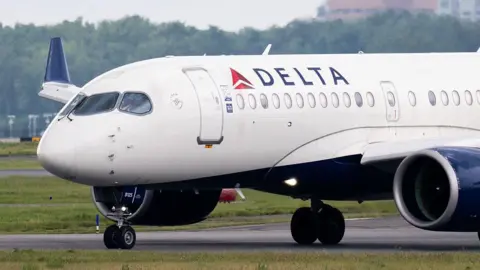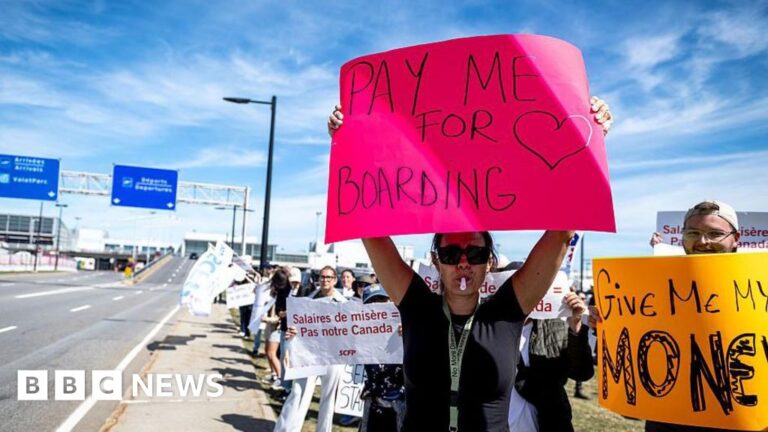BBC News, Toronto
 Getty Images
Getty ImagesWhen Air Canada flight attendants walked off the job earlier a week ago, they had one rallying cry: “Unpaid work won’t fly.”
It was a reference to the long-standing practice in North America’s aviation industry of not paying cabin crew for work they do when they are on the ground, before the plane is in motion.
In contrast, some European airlines, industry experts told the BBC, pay cabin crew monthly wages rather than by the hour.
The pay structure surprised Canadian flyers, many of whom supported the striking workers, one poll commissioned by the union suggested.
The brief strike wreaked havoc during the peak summer travel season, but flights resumed after both sides agreed to a tentative deal on Tuesday.
The proposed agreement reached by the Canadian Union for Public Employees (Cupe) and Air Canada has not been fully released, but those familiar with its contents report that it includes a pay bump over several years and, most notably, partial pay for boarding duties and cabin secure checks before take off – a first.
Experts say the wins secured by Air Canada’s cabin crew could help solidify a new standard for aviation workers on the continent.
The union called it “historic” earlier this week, declaring unpaid work “over”.
But media has reported that many flight attendants, who must still vote to approve the deal, remain dissatisfied. It is unclear if the deal has enough support to pass, Reuters reported.
Air Canada flight attendants were not alone in not being paid for what the industry calls “ground work”.
Cabin crew for other Canadian airlines Air Transat and WestJet do not have ground pay as part of their compensation structure. Neither do flight attendants at US-based United Airlines, though contract negotiations are currently ongoing.
John Gradek, a business professor and aviation management expert at McGill University in Montreal, said that introducing ground pay for Air Canada workers could trigger a “tsunami” that would soon sweep all major airlines in North America.
For decades, the practice was justified on the basis that it is easier to track hours of when a plane leaves the gate and lands, he said. It is more difficult to include boarding time, which can vary depending on delays and the number of passengers.
To mitigate this, airlines bumped up the hourly pay of cabin crew, though many argue the total wages are still low, especially for those living in major, often expensive, North American cities.
Air Canada has said that half of its “mainline flight attendants” earned more than C$54,000 ($39,000; £29,000) last year, with some of the more senior staff earning more than C$70,000.
The figures were slightly different for Air Canada Rouge, the carrier’s discount wing.
One long-time Air Canada flight attendant, Leslie Woolaver, told local news outlet the Halifax Examiner that she estimated she did about 40 hours of unpaid work a month.
That figure is similar to what was reported by nearly 10,000 flight attendants in a survey done by Cupe in late December 2022. At the time, Wesley Lesosky, president of the union’s airline division, called unpaid work “a dirty secret in this industry”.
Junior flight attendants are most affected, Ms Woolaver told the Halifax Examiner, as they tend to work shorter flights.
 Getty Images
Getty ImagesChanges in the air, and on the ground
Attitudes towards ground pay began to shift after the Covid-19 pandemic, which brought in new rules around masking on planes and greatly altered how cabin crew prepare a plane for take off.
Steven Tufts, a professor and labour expert at York University in Toronto, said this “increased complexity of boarding passengers put a lot of pressure on flight attendants” and forced them to work even more unpaid hours.
“Eventually they said: ‘No. This has to change,'” he said.
Delta Airlines led the charge in 2022 when it became the first in North America to offer cabin crew pay for work they did on the ground. American Airlines and Alaska Airlines quickly followed.
After the tentative agreement with Air Canada was reached, the airline’s chief operations officer Mark Nasr told the CBC that the carrier cabin crew will now receive “industry leading compensation”.
“Ground pay is settled. Our flight attendants will be paid for time on the ground.”
But the future of the deal remains unclear.
On Friday, Reuters spoke with several airline workers who remained unhappy with the proposed deal, specifically citing ground pay and how it impacts wages for entry-level workers.
Mr Lesosky told the outlet that further strikes would be illegal, and that wage disputes would likely be resolved at arbitration while the other parts of the agreement moved forward.
Regardless of the outcome, some form of ground pay is likely to stay.
With Air Canada – the largest airline in Canada – now hopping on board, industry watchers say a new precedent is being set for the global airline industry.
Both Air Transat and WestJet have contract negotiations coming up. Prof Gradek said he believes ground pay will be an easy win for them, as they will want to keep their wages competitive.
More broadly, the gains secured as a result of the Air Canada strike have also been hailed as a turning point for labour rights in Canada because of the union’s refusal to comply with a back-to-work order.
The federal government invoked Section 107 of the Canada Labour Code, which has been used in recent years to end job actions and force binding arbitration.
This time, public sympathy was largely on the side of the striking workers due to the focus on unpaid labour, Prof Gradek said.
“This was a master class of negotiation by the union,” he said.


